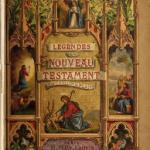 “Memories are always partly untrue,” writes Daniel Nayeri. “A patchwork story is the shame of a refugee.” Nayeri nonetheless offers his readers the gift of his most precious childhood memories, recounting them as if he were his 12-year-old self writing for his teacher, Mrs. Miller. Everything Sad is Untrue (A True Story), his newest work, is a memoir aimed at a middle-school aged audience, but adults will find this is a book to come back to again and again.
“Memories are always partly untrue,” writes Daniel Nayeri. “A patchwork story is the shame of a refugee.” Nayeri nonetheless offers his readers the gift of his most precious childhood memories, recounting them as if he were his 12-year-old self writing for his teacher, Mrs. Miller. Everything Sad is Untrue (A True Story), his newest work, is a memoir aimed at a middle-school aged audience, but adults will find this is a book to come back to again and again.
Nayeri writes about a privileged childhood spent in Iran, born to a family whose pedigree stretches back hundreds of years. He writes about the flight from Iran that became necessary when his mother became a Christian, their years spent as refugees in Europe, and their eventual resettlement in Oklahoma. He skillfully weaves his memories together with family stories and old Persian tales. It’s not always obvious which of his offerings are myths, which are legends, and which are based in history.
That’s part of the point of the book. It turns out the boundaries between the three aren’t as well defined as we expect. “This was my life, as I experienced it,” he writes, “and it is both fiction and nonfiction at the same time. Your memories are too, if you’ll admit it.” (p. 354)
Magic Carpet Ride
Nayeri describes himself as a modern-day Scheherazade, weaving his tales into an exquisite verbal Persian rug. When Mrs. Miller complains that he has “lost the plot,” he tells her she is
“…beholden to a Western mode of storytelling that I do not accept… The point of the [1,001 Arabian] Nights is that if you spend time with each other – if we really listen in the parlors of our minds and look at each other as we were meant to be seen – then we would fall in love. We would marvel at how beautifully we were made.” (p. 301)
Elsewhere he explains,
“…you have to understand the point of all these stories. What they add up to. Scheherazade was trying to make the king human again. She made him love life by showing him all of it… Little by little, he began to feel the joy and sadness of others.
He became less immune, less numb, because of the stories.
And what about you?” (p. 237)
A Whole New World
The hinge upon which all of Daniel’s stories turn is his mother’s conversion to Christianity. Nayeri doesn’t hedge here, doesn’t offer his usual legends or myths. Why would a wealthy, well-educated woman with a successful medical practice leave Iran’s upper classes to perform menial labor in Oklahoma?
“She’ll tell you—it’s worth it. Jesus is better.
It’s true.
We can keep talking about it, keep grinding our teeth on why Sima converted…
We can wonder and question and disagree.
But you can’t make Sima agree with you.
It’s true.
Christ has died. Christ is risen. Christ will come again.” (p.197)
This book is aimed at a middle-school aged audience, though some in that group will find the descriptions of violence upsetting. Others may find the format confusing; though the book is 356 pages long, there are no chapter breaks, and not much in the way of a unifying plot. This is the book’s greatest strength: in true Persian fashion, Nayeri furnishes his guests – his readers – the best he has “in the parlors of our minds”, woven into a sumptuous carpet plied with his stories.
Don’t expect a traditional western-style chapter book within these pages. Search instead for warp and woof.
Adults will enjoy this book even more than its young intended audience. 12-year-old Daniel may be the narrator, but modern-day Daniel is a skillful writer. He also has considerably more life experience than his 12-year-old persona. Christians will appreciate Nayeri’s book for its unflinching portrayal of his mother’s conversion. Non-Christians who have been puzzled or hurt by a friend or family member’s conversion may understand better after reading Daniel’s explanation of his mother’s actions.
They may even find that everything sad is untrue.
——————-
I am thankful whenever I can read Rachel Motte and thank her for this guest post. Rachel Motte is a freelance writer, journalist and editor specializing in social issues and educational affairs. Her work has appeared at CNN.com, The Evangelical Outpost, and in numerous other print and internet publications. She is an alumna of Biola University, the Torrey Honors Institute, the Leadership Institute, and the World Journalism Institute.











